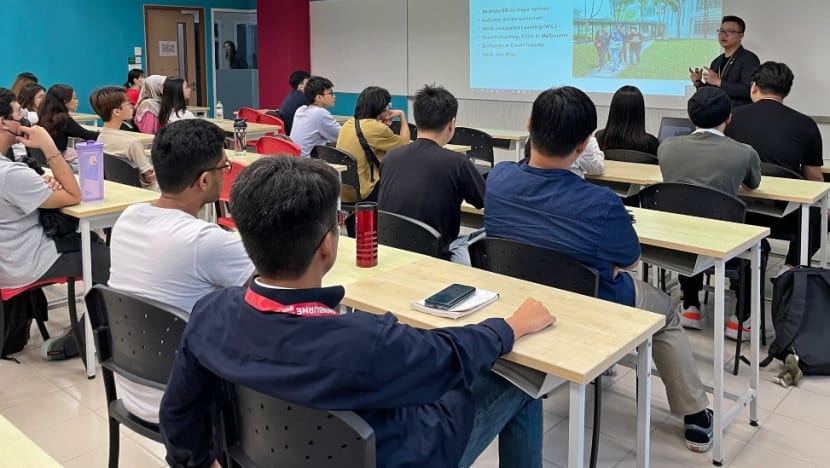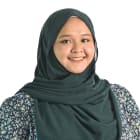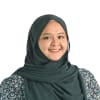Sarawak’s groundbreaking move in offering free tertiary education requires sound financing plan, say experts
The Borneo state will be the first in Malaysia to provide free tertiary education to those born there when the policy is implemented from 2026.

Students in a classroom at state-owned tertiary institution Swinburne University of Technology Sarawak. (Photo: Facebook/Swinburne University of Technology Sarawak)

This audio is generated by an AI tool.
SINGAPORE: Sarawak premier Abang Johari Openg has given more details on the state’s free tertiary education policy expected to be implemented from 2026, stressing that those planning to take up technical and financial courses will be prioritised.
Such courses include engineering, accountancy, cyber analysis, cyber law as well as computer science, local media reported.
These courses, said Mr Abang Johari, allow the students better chances of securing employment after graduation.
“By the year 2026, whether they are poor or rich, they will receive free tertiary education so long as they are eligible to study at the state-owned institutions,” Mr Abang Johari was quoted as saying by the Malay Mail on Wednesday (Dec 20).
The idea of free tertiary education for Sarawak natives was first mooted by Mr Abang Johari as his birthday wish in August last year.
Some 25,000 students in Sarawak’s state-owned universities and higher learning institutions stand to benefit from the policy.
Analysts say that Sarawak’s decision to provide free tertiary education to its native citizens - the first state in Malaysia to do so - has the potential to hasten the social mobility of its young people, calling it an example for other states in the country to emulate.
However, some have also cautioned that a sound financing model is needed to ensure the sustainability of the policy.
“While free education is a commendable effort to invest in human capital, sustainable funding models and careful economic planning are crucial,” said Dr Saidatulakmal Mohd from Universiti Sains Malaysia (USM).
According to Dr Zaimuariffudin Shukri Nordin - the head of education at Universiti Malaysia Sarawak’s (UNIMAS) Faculty of Education, Language and Communication - an estimated 2.9 million people currently reside in the state, with nearly one million under the age of 24 as of 2020.
“Sarawak will be the first state to offer a free education program to its citizens.
“The state government undoubtedly considers this as a chance to give back to the community. In the long run, it will help them by attracting talent to the state and gaining intellectual capital,” he told CNA.
POSITIVE IMPACT OF POLICY ON SOCIAL MOBILITY AND LOCAL ECONOMY
Analysts whom CNA spoke to said that the free tuition policy for tertiary students could help enhance the social mobility of young Sarawakians.
Dr Anuar Ahmad, a lecturer at the National University of Malaysia’s (UKM) education faculty, noted that with more local youths enrolled in higher education institutions, “the social mobility of Sarawak's young generation will also improve in a short time”.
“Certainly, free education will open up more opportunities for Sarawak’s youths to pursue higher education at the university level, especially from poor families,” he told CNA.
Separately, Dr Saidatulakmal said that from an economic perspective, the free tuition policy would ensure “a well-educated workforce to support the demands of … an economy that is becoming highly industrialised, knowledge-based and digitalised”.
This could potentially lead to increased productivity and economic growth, she added.
The policy would also foster more collaboration between the industry and private sectors to ensure a sustainable education for the future population, through effective industry research funding, partnership and engagement, said Dr Saidatulakmal.
NEED FOR MEASURES TO ENSURE POLICY SUSTAINABILITY
However, the analysts also stressed that economic considerations need to be addressed to ensure the sustainability of the free tertiary education policy.
“How will free funding be done sustainably if the number of students who want to study in higher education institutions owned by the Sarawak government increases by a lot?” asked Dr Anuar.
Agreeing, Dr Saidatulakmal also noted that the provision of free education could strain Sarawak’s finances.
“Balancing the benefits of an educated population with the financial implications is key for the long-term success of such a program,” she told CNA.
Dr Saidatulakmal added that the policy could potentially lead to increased taxes or cuts in other development areas to compensate for a strain on the state government budget.
“Hence, a sound financing model is required to mitigate such negative impacts,” she said.
Financing models that could be considered include the German model of higher education financing - which includes sharing finances between the federal government, state government and municipalities - or a contribution from the private sector through smart financing partnerships, she said.
Other measures like the Islamic model of waqf financing, or a financing model that utilises the sovereign fund could also be considered, said Dr Saidatulakmal.
Associate Professor Hugh Leong - the Head of School, Design and Arts of Swinburne Sarawak - told CNA that the creation of a larger pool of educated workers in Sarawak will pave the way for increased innovation, productivity and economic growth to the state.
“In the short term, the state may face an increased economic burden to fund the program. However, I feel that the long term gains far outweigh the short-term pains,” said Dr Leong.
In September last year, Mr George Lam - the special assistant to Pending assemblywoman Violet Yong - pointed out that the tuition fees at universities owned by the Sarawak government were "far higher" than public universities in Malaysia.
“To complete a degree course from Foundation in Swinburne University of Technology Sarawak and Curtin University is in the range of RM80,000 (US$17,200) to RM140,000, depending on the courses.
“In Universiti Teknologi Sarawak it is slightly lower which is in the range from RM40,000 to RM100,000," Mr Lam was quoted as saying by the Borneo Post.
SARAWAK FINANCIALLY PREPARED FOR POLICY ROLLOUT
While noting these economic concerns, the analysts said that Sarawak - compared to other states in Malaysia - is more than prepared to roll out the free tertiary education policy.
Economist Dr Shankaran Nambiar told CNA that Sarawak has actively been trying to strengthen its financial stability, such as through a newly-minted sovereign wealth fund and talks of sharing oil and gas revenue with Malaysia energy firm Petronas.
“With more funds at its disposal and greater financial autonomy, the state will be able to provide education for its residents,” said Dr Shankaran, adding that Sarawak has been working towards a form of fiscal decentralisation.
“Given the revenue that would be at its disposal in exercising fiscal federalism, the state is in no danger of faltering.”
Separately, Dr Nabillah Abdullah from the MARA Technological University (UiTM) said that other states in Malaysia could introduce a similar policy, depending on the will and vision of the states’ leaders.
“If a particular state leader does not politicise education and has a strong team that knows how to implement education reforms according to the mould they want, then perhaps they can match the progress that Sawarak has achieved,” she told CNA.
Meanwhile, Dr Anuar said that states with high incomes should follow in the footsteps of the Sarawak government by looking at the opportunity to provide free education for their citizens.
Prior to Sarawak’s free tertiary education policy, the federal government had in 2019 - under the leadership of former prime minister Dr Mahathir Mohamad - planned to introduce free education for all tertiary students in Malaysia.
However, it did not come to fruition following the fall of the then-government in Feb 2020.
And earlier in June, Prime Minister Anwar Ibrahim said that he believed that tertiary education should be free for all Malaysians - except for the rich - in a forum with tertiary students at UKM in Bangi.
Local media reported that Mr Anwar said that he was not able to implement such a policy immediately due to the federal government's financial constraints.

















